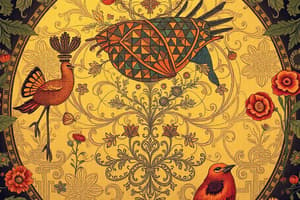Podcast
Questions and Answers
Why did Erikson change his surname from Homburger to Erikson?
Why did Erikson change his surname from Homburger to Erikson?
- To pursue a career in art
- To identify with his Danish heritage
- To distance himself from his stepfather
- To become a U.S. citizen (correct)
Why did Erikson's mother go to Germany to give birth?
Why did Erikson's mother go to Germany to give birth?
- To avoid social stigma (correct)
- To receive better medical care
- To be closer to her Danish family
- To meet her future husband
What was the role of Dr. Theodore Homburger in Erikson's life?
What was the role of Dr. Theodore Homburger in Erikson's life?
- Erikson's pediatrician and stepfather (correct)
- Erikson's mentor in psychology
- Erikson's biological father
- Erikson's art teacher
How did Erikson's classmates react to him due to his Jewish stepfather?
How did Erikson's classmates react to him due to his Jewish stepfather?
What did Erikson use to discover his identity?
What did Erikson use to discover his identity?
Where did Erikson study art and display his work?
Where did Erikson study art and display his work?
What led Erikson to enter child development studies?
What led Erikson to enter child development studies?
What is a common theme in Erikson's life struggles and identity development?
What is a common theme in Erikson's life struggles and identity development?
According to Erikson, how do we develop virtues or positive traits?
According to Erikson, how do we develop virtues or positive traits?
What is the outcome of successfully resolving psychosocial conflicts?
What is the outcome of successfully resolving psychosocial conflicts?
What does inconsistent care or neglect lead to in Erikson's first stage?
What does inconsistent care or neglect lead to in Erikson's first stage?
What is the opposite of autonomy in Erikson's second stage?
What is the opposite of autonomy in Erikson's second stage?
How do supportive parents foster a sense of purpose in their children?
How do supportive parents foster a sense of purpose in their children?
What is the outcome of maladaptive behaviors in Erikson's theory?
What is the outcome of maladaptive behaviors in Erikson's theory?
How does Erikson's theory differ from Freud's?
How does Erikson's theory differ from Freud's?
What is the primary driving force behind development in Erikson's theory?
What is the primary driving force behind development in Erikson's theory?
Who sparked Erikson's interest in psychoanalysis and child development?
Who sparked Erikson's interest in psychoanalysis and child development?
What was Erikson's initial hesitation to marry due to?
What was Erikson's initial hesitation to marry due to?
What did Erikson explore in his research on South Dakota's Sioux Indians?
What did Erikson explore in his research on South Dakota's Sioux Indians?
What did Erikson term as the main problem people have in understanding themselves?
What did Erikson term as the main problem people have in understanding themselves?
What did Erikson establish in the United States?
What did Erikson establish in the United States?
What was the significance of Erikson's three marriage ceremonies?
What was the significance of Erikson's three marriage ceremonies?
Who did Erikson collaborate with on his research projects?
Who did Erikson collaborate with on his research projects?
What was Joan Serson's role in Erikson's life?
What was Joan Serson's role in Erikson's life?
Flashcards are hidden until you start studying
Study Notes
Erik Erikson's Life and Contributions
- Analyzed by Anna Freud, which sparked Erikson's interest in psychoanalysis and child development
- Met Joan Serson in 1929 and fell in love, but initially hesitated to marry due to fears and societal expectations
- Married Joan three times on different occasions, and she became his intellectual partner
Professional Growth and Interest in Culture and Childhood
- Established a psychoanalytic practice in the US, working with emotionally disturbed youth
- Started graduate work at Harvard University
- Explored culture's impact on childhood, collaborating on studies, including research on South Dakota's Sioux Indians
Emphasis on Culture and Identity
- Stressed the role of culture in shaping identity development
- Introduced the concept of "identity confusion," which refers to not having a clear sense of who you are
Identity Theory
- Introduced the concept of identity crisis, which is a struggle to find one's sense of identity
- Identified eight stages of lifespan development, each with a unique crisis or conflict that must be resolved
Erik Erikson's Life Struggles
- Born in Germany to a Danish mother, who later married Erikson's pediatrician, Dr. Theodore Homburger
- Experienced parentage uncertainty, leading to struggles with identity and self-doubt
- Changed surname to Erikson from Homburger at 37 upon becoming a US citizen
Artistic Pursuits and Search for Identity
- Used artistic talent to discover who he was and explore his identity
- Traveled in Europe and avoided a regular lifestyle, leading to a deeper understanding of identity crisis
Stages of Development
- Trust vs. Mistrust (Infancy): Infants develop trust when caregivers consistently meet their needs, or mistrust if care is inconsistent
- Autonomy vs. Doubt and Shame (Early Childhood): Children seek autonomy, but overly restrictive parenting can lead to doubt and shame
- Initiative vs. Guilt (Preschool Years): Children explore and take initiative, but overly critical parents can induce guilt
Studying That Suits You
Use AI to generate personalized quizzes and flashcards to suit your learning preferences.




